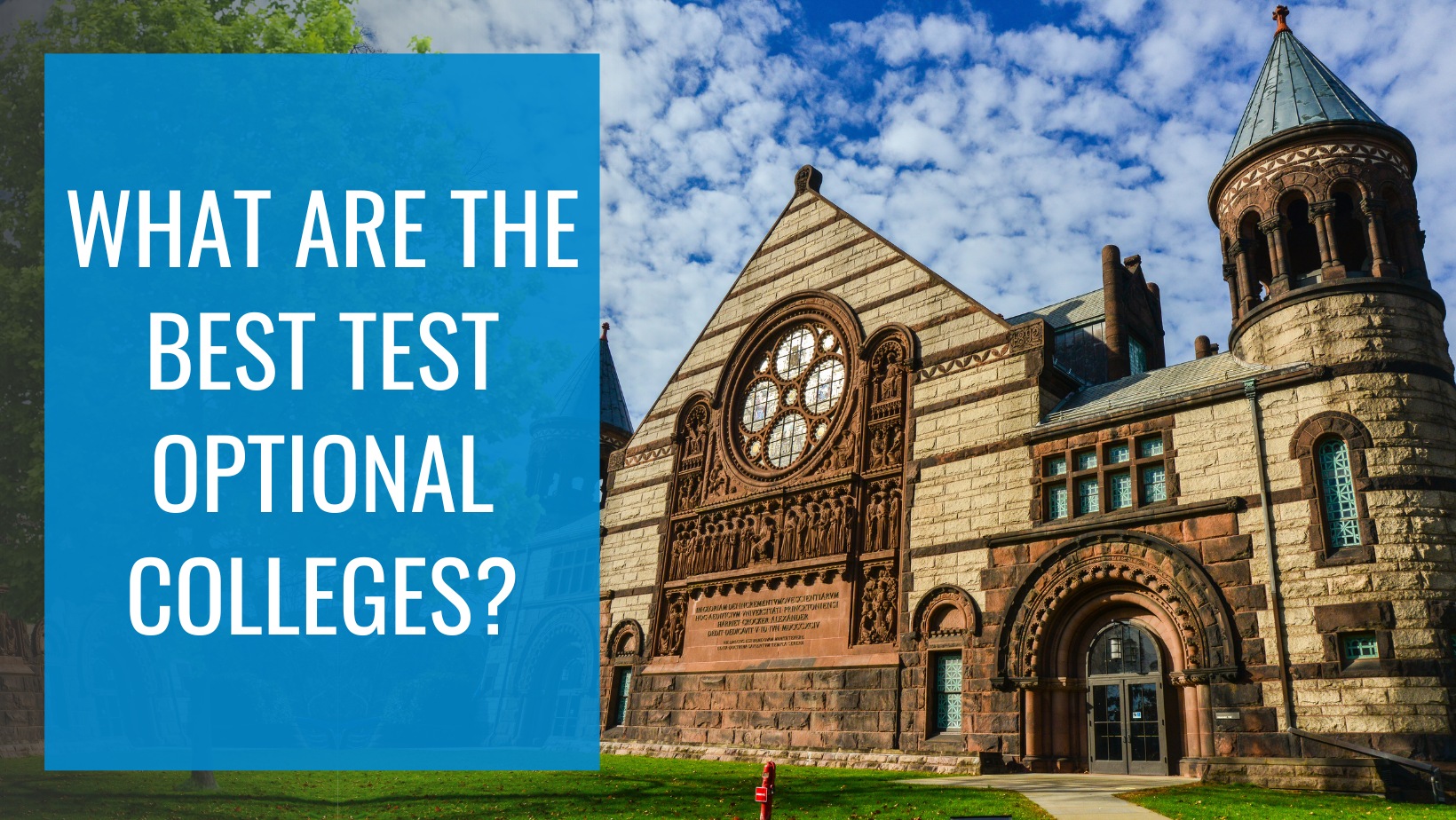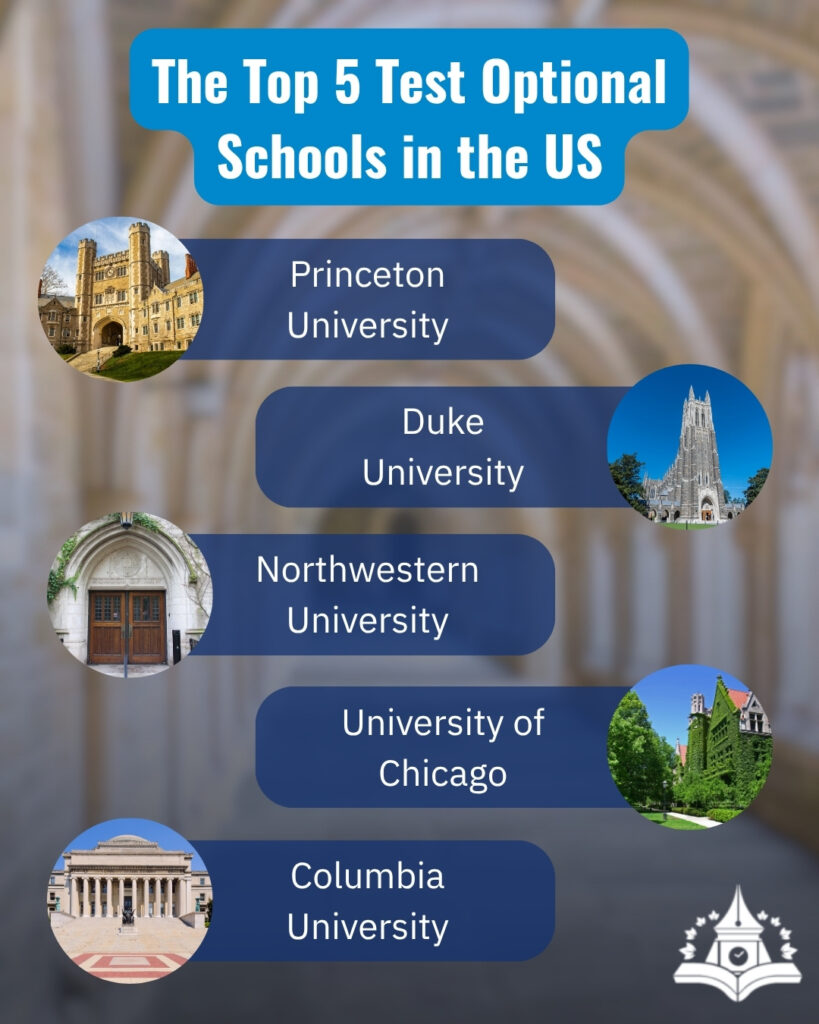Test Optional. A phrase that, ever since its rise to the forefront during the COVID-19 pandemic, has left many students feeling nervous and confused. In 2025, Test Optional isn’t a new term. High school counselors and admissions officers alike are regularly having conversations with students around the world, educating them on what exactly Test Optional is, what it really means, and what role it plays in the college admissions process. If you are new here, or just starting out your journey, check out some of our previous blog posts on Test Optional: Why Are Some Colleges Test Optional? | Solomon Admissions Consulting, SAT/ACTs: Standardized Testing’s Role in College Admissions
Now that you’re caught up on what Test Optional is, and the role it plays in the admissions process, let’s talk about the two purposes of this article today:
- Outlining which Colleges are currently Test Optional
- Discussing what the “best” Test Optional Colleges are

Let’s Begin!
Test Optional – What you need to know
Before talking about which colleges are Test Optional, there are some important things you should know.
- Every college has its own testing policy. If you are familiar with testing policies, this may not be news to you. However, if you are just starting out, this is good information to know! Even though we are focusing on Test Optional today, you should also be aware of other testing policies you may see on a college’s website:
- Test Required – colleges with this policy require that students submit or report test scores
- Test Blind – standardized test scores are not considered during the admissions process at these colleges, even if they are provided. This can also be referred to as Test Free.
- Test Flexible – students are required to submit test scores but can choose which kinds of tests to submit. This can be anything from SAT/ACT to AP and IB Exams. This is a less common policy, and you should always research the specific school to see which tests they accept. One school that currently uses this policy is Yale.
- Just because a college has Test Optional policies right now does not mean that they will still be Test Optional when you apply. There are some colleges that have what I refer to as permanent Test Optional policies, and others that have more tentative Test Optional policies.
- So, if colleges can constantly change their policy, how do I know if they are test-optional? That’s easy, check their website! Oftentimes, you can type in a simple Google search “(Insert College Name) Testing Policy for Admission” and the college’s webpage will pop up and let you know their polices. A note of caution: Be careful with this method and only click on official college links! You want to always verify the information from the school itself.
What Colleges are Currently Test-Optional
As I mentioned earlier, colleges can change their policies for the upcoming year. Therefore, the list below is as of March 2025, and can be subject to change depending on policy changes. Again, it’s always best to be your own advocate and double-check on a school’s website. For ease, I have included links to the college websites in the table below. As a note, you will find that as of 2025, most Ivy League schools have re-adopted their Test Required policies.
Guidelines for this list:
- All colleges on the U.S News Top 50 were considered for National Universities, and the Top 15 Liberal Arts Colleges
- Colleges that adopt test-blind policies (e.g., University of California) or test-flexible policies were not included
- Hold Ctrl + F to search for a specific college
Test Optional Colleges 2025
| College Name | Policy Type | Policy Dates | Website |
|---|---|---|---|
| Princeton University | Test Optional | Applies to applicants in Fall 2025 | View Policy |
| Duke University | Test Optional | 2025–2026 admissions cycle | View Policy |
| Northwestern University | Test Optional | Dates not specified | View Policy |
| University of Chicago | Test Optional | Dates not specified | View Policy |
| Columbia University | Test Optional | Dates not specified | View Policy |
| Rice University | Test Optional (Submission Recommended) | Dates not specified | View Policy |
| University of Notre Dame | Test Optional | Through at least 2025–2026 | View Policy |
| Vanderbilt University | Test Optional | Through Fall 2027 | View Policy |
| Carnegie Mellon University | Test Optional | Through Fall 2025 | View Policy |
| University of Michigan | Test Optional | Fall 2025 application cycle | View Policy |
| Washington University in St. Louis | Test Optional | Dates not specified | View Policy |
| Emory University | Test Optional | 2025–2026 admissions cycle | View Policy |
| University of Virginia | Test Optional | Through Fall 2026 | View Policy |
| University of North Carolina – Chapel Hill | Conditional Test Optional (Certain GPA) | 2025–2026: ≥2.8 GPA optional; <2.8 requires scores 2026–2027 and beyond: ≥2.8 optional; <2.8 requires ACT ≥17 or SAT ≥930 | View Policy |
| University of Southern California | Test Optional | Applies to 2026–2027 academic year | View Policy |
| New York University | Test Optional – Tentative | 2024–2025; has yet to be renewed for 2025–2026 | View Policy |
| University of Illinois Urbana-Champaign | Test Optional | Dates not specified | View Policy |
| Boston College | Test Optional | Dates not specified | View Policy |
| Tufts University | Test Optional | 2021–2026 | View Policy |
| University of Wisconsin–Madison | Test Optional | Through Spring 2027 | View Policy |
| Boston University | Test Optional | Through Fall 2028 and Spring 2029 | View Policy |
| Rutgers University – New Brunswick | Test Optional | Through 2026 | View Policy |
| University of Maryland – College Park | Test Optional | Through Spring and Fall 2025 | View Policy |
| University of Rochester | Test Optional | Dates not specified | View Policy |
| Lehigh University | Test Optional | Indefinitely | View Policy |
| University of Washington | Test Optional | Since 2020 | View Policy |
| Wake Forest University | Test Optional | Since 2008 | View Policy |
| Case Western Reserve University | Test Optional | Dates not specified | View Policy |
| Texas A&M University | Test Optional | For the foreseeable future | View Policy |
| Virginia Tech | Test Optional | Through Fall 2028 | View Policy |
| Northeastern University | Test Optional | For the foreseeable future | View Policy |
| Williams College | Test Optional | Through Fall 2025 | View Policy |
| Amherst College | Test Optional | Dates not specified | View Policy |
| Swarthmore | Test Optional | 2023–2025 | View Policy |
| Bowdoin | Test Optional | Dates not specified | View Policy |
| Pomona College | Test Optional – Permanent | Since 2023 | View Policy |
| Wellesley College | Test Optional – Tentative | 2025; has yet to be renewed for 2025–2026 | View Policy |
| Carleton College | Test Optional | Dates not specified | View Policy |
| Claremont McKenna | Test Optional | Through Fall 2027 | View Policy |
| Harvey Mudd College | Test Optional | Through 2026 | View Policy |
| Vassar College | Test Optional – Permanent | Since 2023 | View Policy |
| Barnard College | Test Optional | Through 2027 | View Policy |
| Davidson College | Test Optional | Dates not specified | View Policy |
| Hamilton College | Test Optional | Dates not specified | View Policy |
| Smith College | Test Optional | Since 2009 | View Policy |
| Wesleyan University | Test Optional | Since 2014 | View Policy |
What are the “Best” Test Optional Colleges
Whenever I hear a student ask, “What is the Best x” in relation to college admissions, I always have a follow-up question. What do you mean by “Best”? For some, the “Best” might be the most selective college on the above list. In that case, the “Best” Test Optional college is Princeton, because that is arguably the most selective college on the above list that offers a test-optional policy right now. For others, “Best” may mean the college they have the “best” chance of getting into Test Optional. And the answer to that question is truly dependent on the students’ individual strengths they would be presenting in their admissions application.

In this consultants’ opinion, the best test-optional colleges are those with holistic admissions processes that do not rely on test scores, *where the student can be a competitive applicant without submitting test scores. For example, the University of Chicago states they have a “No Harm” policy for application review when considering SAT or ACT scores. Any SAT or ACT score submitted will only be used in review if it will positively affect an applicant’s chance of admission. Test scores that may negatively impact an admission decision will not be considered in review. The University of Washington – Seattle, while technically Test Optional, removed their testing requirement permanently, and only use test scores as a positive to advocate for students who may fall under their mid-50th percentile for GPAs. Other data points to look for include colleges that admit successful classes of students largely filled with Test Optional students, and colleges that have held Test Optional policies for a long period of time. For example, Bowdoin (a top 10 Liberal Arts College) 54% of students who were admitted in their last year’s class were Test Optional, and they have had a Test Optional policy since 1969!
*While considering these factors are important, in an absence of test scores, a student still needs to be outstanding in the other areas that a college is looking for, including other academic factors, extracurriculars, and off-campus projects.
Concluding thoughts
Now that you have read through this article, you should have a stronger understanding of what test-optional admissions is, what colleges offer it, and tips to figuring out the “Best” Test Optional colleges for you. However, as previously noted, while these factors are significant, making an informed decision regarding a test-optional college requires an initial assessment of whether you would be considered a competitive applicant without including a test score. Schedule a consultation with us today to learn more!

Former Admissions Reader at The University of Michigan
3 years in University of Michigan Admissions
3,500+ Applications Read and Evaluated
Ever since graduating with her bachelor’s degree, Shayla Lebeck knew her passion lied within supporting students. Years later, Shayla has a graduate degree in Higher Education/Student Affairs with a concentration in academic advising.



